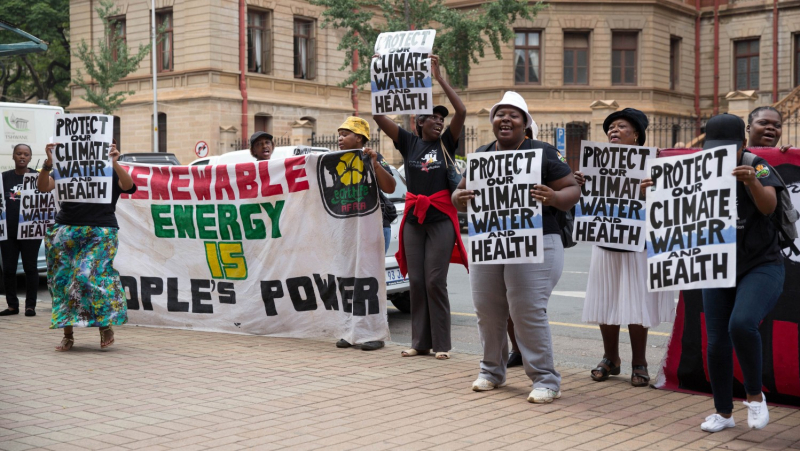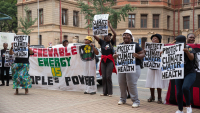Project – On record
This profile is no longer actively maintained, with the information now possibly out of dateNicole Loser, Attorney at Centre for Environmental Rights, South Africa

Project – On record
This profile is no longer actively maintained, with the information now possibly out of dateNicole Loser, Attorney at Centre for Environmental Rights, South Africa
What must happen
The devastating local and global environmental impact of coal-fired power plants has been well established. The Paris Climate Agreement goals require a managed decline of fossil fuel production, and the construction of new coal fired power plants is not compatible with this. Banks should avoid any involvement in this dodgy deal as part of a move to stop financing new coal-fired power plant developments anywhere in the world.
| Sectors | Coal Electric Power Generation |
| Location |
|
| Status |
Planning
Cancelled
Agreement
Construction
Operation
Closure
Decommission
|
|
|
This project has been identified as an Equator Project |
The Thabametsi project is a planned 630MW coal-fired power plant near Lephalale in South Africa's Limpopo province. The project is being developed by the Thabametsi Power Company, a special purpose vehicle owned by Marubeni and South Korean energy utlility KEPCO. The coal for the Thabametsi Power Plant will be supplied by the South African mining company Exxaro Resources' Thabametsi mine in the same location.
The plant poses severe risks to local communities' water security and will be one of the most emissions-intensive coal-fired power stations in the world. The plant is expected to be operational in 2021 and is planned to cost USD 2 billion.
Social and human rights impacts
Coal-fired power stations are water-intensive, a major concern in water-scarce South Africa. The plant’s climate change impact assessment shows that water availability and deteriorating water quality in the already water-stressed Lephalale area pose a high risk to the power station’s operation over its intended 30 year lifespan, especially because planned industrial expansion in the area will make water increasingly scarce (Mining Review). The assessment mentioned no means of ensuring that the water availability risks to the power station are avoided. Health impacts of the plant are also likely to be substantial.
A March 2017 report on the health impacts of coal-fired power plants in South Africa concluded that these impacts include early deaths, chronic bronchitis, hospital admissions for respiratory and cardiovascular disease and a variety of minor conditions leading to restrictions on daily activity, including lost productivity.
In addition, as Earthlife Africa commented on the project’s Climate Change Impact Assessment, the social cost of Thabametsi’s greenhouse gas emissions have not been calculated or properly taken into consideration.
Environmental and climate impacts
Thabametsi is expected to be responsible for the emission of 9.9 million tons of CO2 equivalent each year, for a period of 30 years, the Climate Change Impact Assessment revealed. This will make Thabametsi one of the most greenhouse gas emission intensive coal power plants in the world (according to Mining Review Africa). Energy-related carbon dioxide (CO2) emissions are the majority of global greenhouse gas (GHG) emissions, which are responsible for having major adverse impacts on climate change. The assessment failed to address several other issues, as Earthlife Africa has stated in their comments of July 2017. For instance it did not take into account the external costs of the project's GHG emissions (climate change impacts on human health, water availability) and the impact it will have on local communities. It failed to propose any measures to adequately mitigate the plant’s emissions.
The Thabametsi project requires USD 2 billion of finance (partly funded by project finance) and is based on a 75:25 debt-equity ratio.
Three South African commercial banks, Nedbank, Standard Bank and FirstRand, which had been considering financing for Thabametsi have announced that they are withdrawing from the project. See the January 2019 press coverage confirming these withdrawals by Nedbank and Standard Bank, and by FirstRand.
In November 2020, the companies listed below have withdrawn from this project.
Domestic companies hold at least 51% of the equity in Thabametsi included the Public Investment Corporation and various black economic-empowerment firms (source miningweekly.com).
Applicable norms and standards
Environmentalists win approval to appeal Limpopo coal plant
2020
2020-11-27 00:00:00 | Consortium pulls plug on South Africa's Thabametsi coal plant
A multinational consortium that was building one of South Africa's first privately-owned coal-fired power plants at Thabametsi has asked to withdraw from the project, the energy ministry said on Tuesday (Market Screener).
2020-11-11 00:00:00 | Marubeni to pull out of Thabametsi coal power plant
Japanese resources company Marubeni Corp 8002.T will pull out of the Thabametsi South African coal plant project following the withdrawal of some South African investors this week. Marubeni's exit from the 630 megawatt (MW) Thabametsi coal-based power plant project also follows the withdrawal of South Korea's state-run Korea Electric Power Corp (KEPCO) last month.
2019
2019-02-03 00:00:00 | Nedbank, FirstRand and Standard Bank withdraw finance for Thabametsi coal power plant
Three of the South African commercial banks, Nedbank, Standard Bank and FirstRand, which had been considering financing for Thabametsi have announced that they are withdrawing from the project. See the January 2019 press coverage confirming the withdrawals by Nedbank and Standard Bank here, and by FirstRand here.




